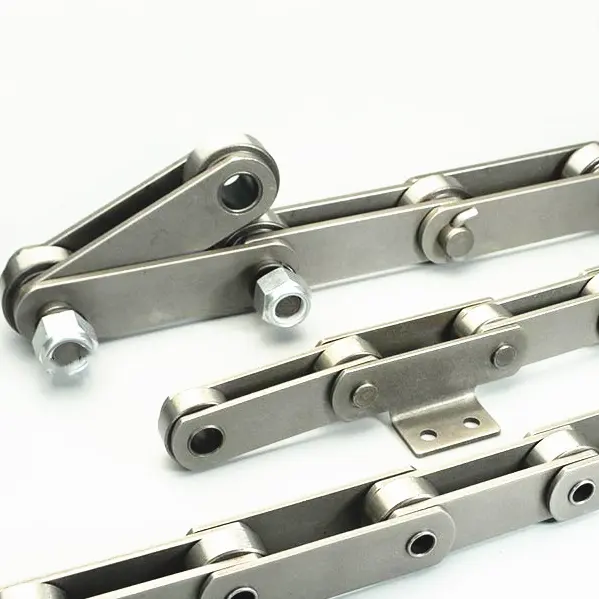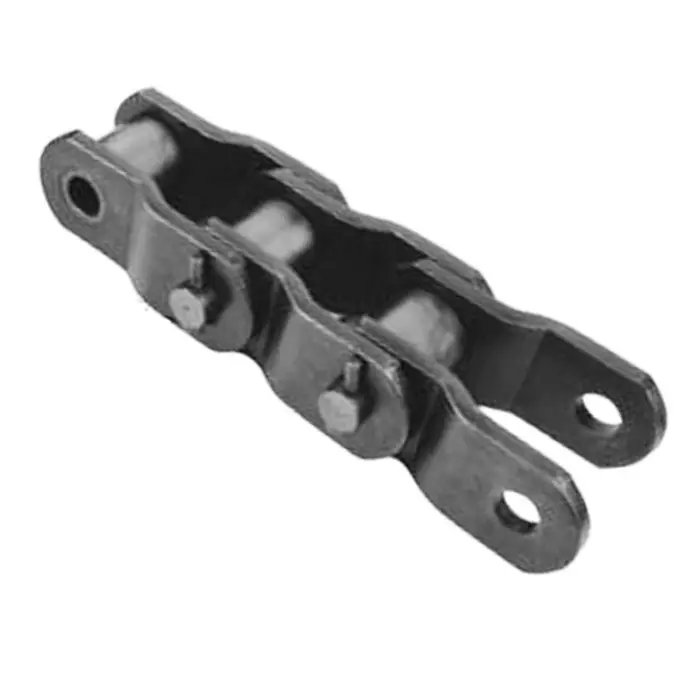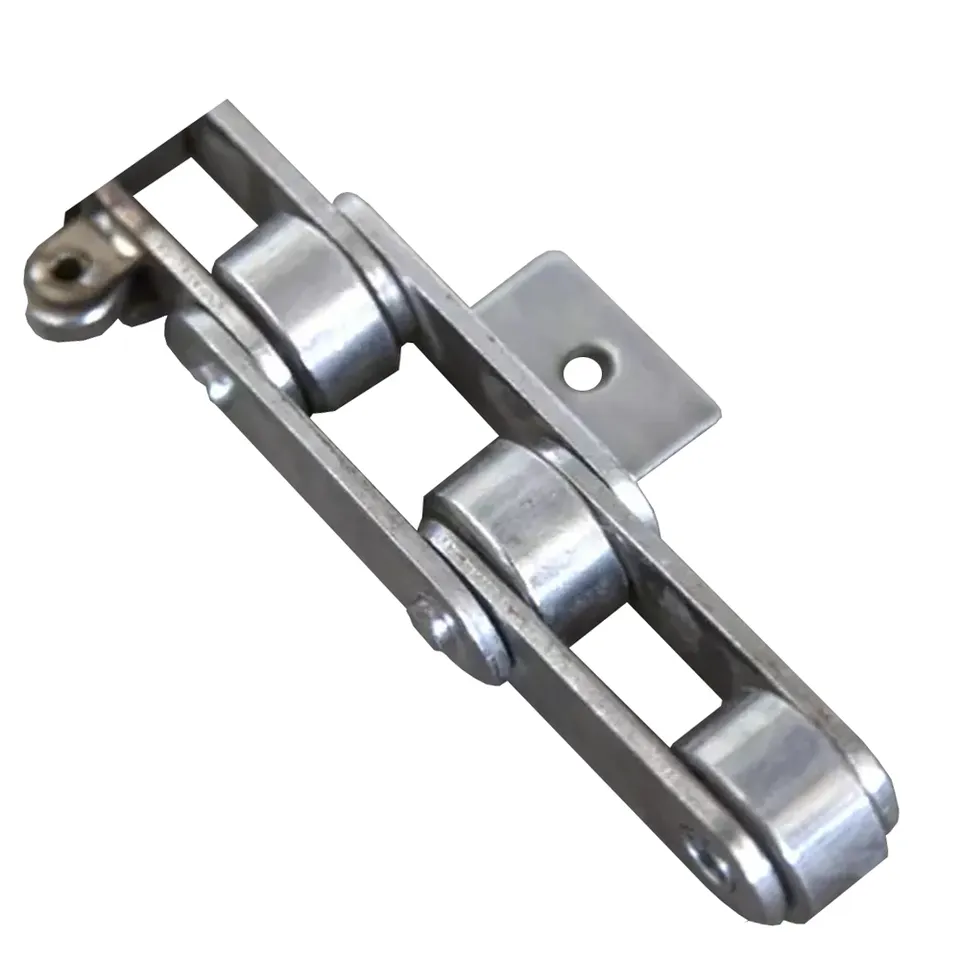Product Description
Product advantages:
| — Ten CoreTechnologies — | |||
| 1 | Chain strengh preload technology | 2 | Pin CRV treatment technology |
| 3 | Plate smoothly punching technology | 4 | Bush oil hole technology |
| 5 | Vacuum Oiled Technology | 6 | Precision Punching Technology |
| 7 | Low frequency fatigue test technology for lange size chain | 8 | Chain length comparison technology |
| 9 | Variation of silence design technology | 10 | Chain dynamic testingtechnology technologies |
Our Advantages:
1. Any inquiry you make will be answered professionally within 6~8 hours.
2. Attaches great importance to product quality and approved by many global quality system certification,such as France, Norway, Germany.
3. Focused on Chain since 1999, have rich experience in Production.
4. High-quality workers,First-class advanced equipment,good quality control,advanced technology.
5. Be Good at Custom-Made Products, provide customized services for customers.
6. Participated in the drafting of 24 national and industrial standards such as chains.As of 2571-Mar, CHOHO has 180 authorized patents.
7. With the responsibility of “Providing high quality chain system with the same service life for the global locomotive industry”, have established a strong R&D team.
By 2571,CHOHO has more than 2,7.
-CHOHO has 4 subsidiaries, including testing technology and international trading companies. has 4 factories in HangZhou, Thailand factory, ZheJiang R&D Center and Tokyo R&D Center. In addition, CHOHO ZHangZhoug Industrial zone is expected to be completed & put into operation next year.
-We specialized in producing all kinds of standard chains and special chains, such as Agricultural Chain, Sprocket, Chain Harrow, Tillage Parts,Rice Harvester Chain, GS38 Chain, Roller Chain, Automobile Chain, Motorcycle Chain Industrial Chain and so on.Our partners among world top enterprises, such as LOVOL,JOHN DEERE,NEWHOLLAND, CLASS,AGCO,DEUTZFAHR,HONDA, KUBOTA etc.
FAQ:
1. Are you manufacturer or trade Company?
We are a factory focused on producing and exporting Chain over 23 years,have a professional international trade team.
2. What terms of payment you usually use?
T/T 30% deposit and 70% against document, L/C at sight
3. What is your lead time for your goods?
Normally 30~45 days.Stock can be shipped immediately.
4. Do you attend any Show?
We attend Hannover show in Germany, EIMA in Italy, CHINAMFG in France, CIAME in China and many other Agricultural machinery shows.
5.Do you offer free samples?
Yes,we can.or you just bear the shipping cost.
6.Is OEM available?
Yes, OEM is available. We have professional designers to help you design.
/* January 22, 2571 19:08:37 */!function(){function s(e,r){var a,o={};try{e&&e.split(“,”).forEach(function(e,t){e&&(a=e.match(/(.*?):(.*)$/))&&1
| Standard or Nonstandard: | Standard |
|---|---|
| Application: | Conveyer Equipment, Agricultural Machinery |
| Surface Treatment: | Polishing |
| Structure: | Roller Chain, Agricultural Machinery Chian |
| Material: | Alloy |
| Other Characteristic: | High Wear Resistance |
| Samples: |
US$ 1/Meter
1 Meter(Min.Order) | |
|---|
| Customization: |
Available
| Customized Request |
|---|
What are the limitations of using mill chains in certain industries or applications?
While mill chains are versatile and well-suited for many industrial applications, they do have some limitations that need to be considered when choosing the right chain for specific industries or applications:
1. Speed Limitations: Mill chains may have limitations on their maximum allowable speed. High-speed applications may require specialized chains designed to handle the increased forces and loads associated with faster operation.
2. Environmental Factors: Harsh operating environments, such as extremely high or low temperatures, corrosive chemicals, or abrasive materials, can affect the performance and longevity of mill chains. In such cases, specialized chains with appropriate coatings or materials may be required.
3. Noise and Vibration: Mill chains can generate noise and vibration during operation, which can be a concern in certain industries or applications where quieter and smoother operation is desired.
4. Misalignment Issues: Misalignment between sprockets can cause premature wear and failure of mill chains. Proper alignment and regular maintenance are essential to ensure optimal performance and longevity.
5. Weight Considerations: In applications where weight is a critical factor, the weight of the mill chains themselves may need to be taken into account, especially when dealing with large conveying systems.
6. Shock Loads: Sudden and heavy loads can put extra stress on mill chains, potentially leading to failure if not properly accounted for in the chain’s design and selection.
7. Customization Challenges: In some cases, unique applications may require highly customized chain designs, which can be more challenging and costly to manufacture.
8. Water and Moisture: Excessive exposure to water and moisture can lead to rust and corrosion, reducing the chain’s lifespan. In environments where water or moisture is prevalent, chains with appropriate coatings or materials should be used.
9. Chemical Resistance: Certain chemicals can be detrimental to the material properties of mill chains. When working with chemicals, it is essential to choose chains that offer the necessary chemical resistance.
Despite these limitations, proper selection, installation, and maintenance of mill chains can overcome many challenges and ensure their effective and reliable performance in various industries and applications.
Can mill chains be used in the aerospace and aviation industries?
Mill chains are typically not used in the aerospace and aviation industries for primary applications due to several reasons:
- Weight and Space Constraints: Aerospace and aviation industries have strict weight limitations, and using heavy mill chains would be impractical for aircraft and spacecraft components.
- High Precision Requirements: Aerospace and aviation applications often require extremely high precision and tight tolerances, which may not be achievable with standard mill chains.
- Specialized Components: Aerospace and aviation industries require specialized components that meet rigorous safety and performance standards. Standard mill chains may not have the necessary certifications or approvals for such critical applications.
- Extreme Environments: Aerospace and aviation components are exposed to extreme conditions such as high speeds, high altitudes, and rapid temperature changes. Mill chains may not be able to withstand these conditions reliably.
Instead, the aerospace and aviation industries use specialized materials and components designed specifically for their unique requirements. These materials often include lightweight alloys, composites, and high-precision components that undergo extensive testing and certification to meet industry standards.
In conclusion, while mill chains are versatile and widely used in various industrial applications, they are not suitable for the aerospace and aviation industries, where specialized components and materials are crucial for safety, performance, and weight considerations.
What are the noise and vibration characteristics of mill chains during operation?
During operation, mill chains may exhibit certain noise and vibration characteristics, which can vary depending on the specific design, condition, and application. Here are some key points to consider:
Noise Characteristics:
1. Rattling or Clanking: In some cases, mill chains may produce a rattling or clanking noise during operation. This noise can be caused by the impact of chain links or attachments as they move along the sprockets or other components.
2. Continuous Hum: Mill chains in well-maintained systems may produce a continuous humming sound, especially in higher-speed applications. The humming noise is often a result of the smooth and consistent movement of the chain links.
Vibration Characteristics:
1. Periodic Vibration: Mill chains can generate periodic vibrations as they pass over sprockets and other components. The vibration frequency is typically related to the chain’s speed and the number of teeth on the sprockets.
2. Smooth Operation: Well-lubricated and properly tensioned mill chains usually exhibit smoother operation with minimal vibration. Proper maintenance is essential to reduce excessive vibration and noise levels.
Noise and Vibration Management:
Excessive noise and vibration in mill chain systems can lead to increased wear, fatigue, and reduced efficiency. To manage noise and vibration:
1. Regular Maintenance: Ensure regular inspection, lubrication, and tensioning of the mill chains to minimize wear and reduce noise levels.
2. Chain Condition: Replace any worn or damaged chain links, sprockets, or attachments to maintain smooth and quiet operation.
3. Proper Tension: Maintaining the correct chain tension is crucial to prevent excessive vibration and noise. Too much tension can lead to increased stress, while too little tension may cause chain slippage and impact noise.
4. Quality and Design: Select high-quality mill chains designed for the specific application. Chains with precision engineering and anti-vibration features can help reduce noise and vibration levels.
Overall, managing noise and vibration in mill chain systems is essential for optimizing performance, reducing maintenance costs, and ensuring a safer working environment.
editor by CX 2024-05-06




